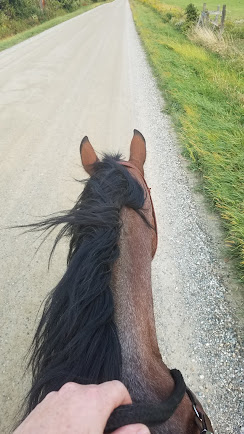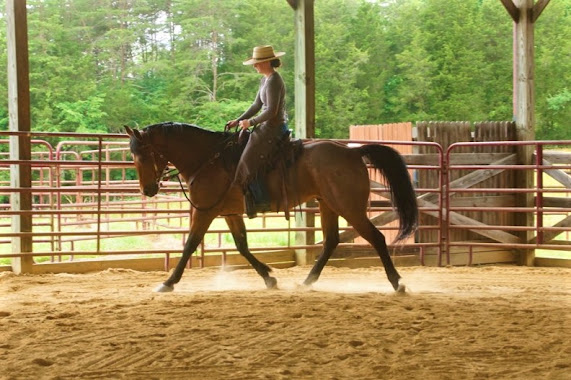Goals...or lack thereof: part I
There is something incredibly satisfying about mapping your goals for any given realm of your life, but if I'm being truthful I am great at the goal-setting piece and less so at the goal-completion piece. My husband would tell you I'm a great starter and finisher, but that middle part (you know, the piece where all the hard work, sweat equity and trial and error happens?) I admittedly fall short.
I know I'm not the only person who flounders here, and in my defense I'm a lot better than I used to be and still improving. There are a lot of reasons why someone might lose steam in the midst of a project: for me, the anxiety and depression demons often play a role. When it comes to horses, both have reared their ugly heads more times than I'd like to admit, but it's provided many valuable opportunities for me to learn healthier (and indeed, more productive) ways to operate than what we are often taught is the "right" way to get something done.
What I'm about to say next might cause some to develop heart palpitations because it's an idea that is SO engrained in many of us, but hear me out.
If you subscribe to the common notion that when you come up against a hardship, a difficulty, a snag, a snafu, that if you just keep pushing, if you persevere, if you throw everything you've got at it, if you do MORE, you'll succeed...take that idea and deposit it into your mental document shredder. Or at the very least, do so when it comes to horses.
It's taken me a really, really long time to get comfortable with this. I'm a Type-A perfectionist by nature: I love black and white, neat and tidy: I adore a good list and step-by-step instructions. Sadly - or at least I thought so initially - our equine friends don't operate this way. Again and again, I come back to the idea that horses are animals that are constantly adjusting to their environment in order to reach that place of perfect physical and emotional balance. Horses exist entirely in the present - as a species, their survival depends on being able to read their surroundings moment to moment. Dwelling on the past or thinking ahead to the future might be the fatal mistake that leads you to getting eaten, so it became a pretty crucial evolutionary life skill to live in the now. It's a concept we humans talk about a lot but aren't as a whole terribly good at.
So what does this all have to do with goals and the idea that one should push through when the going gets rough? Well, at least when it comes to horses, endeavoring to do more to make something happen usually leads to frustration for both parties and over the long term results in the relationship we're trying to build with our animals becoming extremely tenuous, or dissolving completely. And it all comes back to the fact that we are thinking ahead while the horse is thinking right now. In other words, our focus on getting to the goal is the very thing that's creating the conflict.
One of the best examples of this in action is riding our horses away from the barn.
Here, Soni and I were enjoying a nice hack on a breezy late summer day. You can see exactly where both our thoughts are oriented: my hand is forward, the reins are slack, his ears are perked up and his focus is out in front of him. His body is following, as exemplified by his straight neck and his willingness to travel parallel to the edge of the road. All was well.But if you ride, you surely know what it feels like to ride out on a horse that isn't prepared to leave the barn. Jigging, head tossing, looking sideways, attempting to turn around, refusal to travel straight and if it gets really bad, rearing or bolting. In my experience talking to students, working with horses and witnessing other rider's horses on group rides, this is actually closer to the norm for many people.
And what is the common advice given in this scenario? Usually, it's to ride out more. Do more of the thing that your horse is telling you he feels wholly uncomfortable doing, because if you do it more he'll eventually just get used to it. Well, sure, sounds pretty good: after all, we push ourselves to do things we're uncomfortable with all the time, right? But ask yourself, how great does it really feel to force yourself to do something? And how great does it feel if it's someone ELSE telling you "you have to do this thing you don't feel good doing"?
This isn't to say we should never ask our horses or ourselves to do things we're uncomfortable with. We absolutely should. But if we're going to walk away feeling productive and a bit better about the situation, we have to do so in small increments to build confidence and trust that not only CAN we do these things but it can actually be enjoyable. There has to be something positive in it, some light at the end of the tunnel. You don't start a workout routine by doing hundreds of squats and push-ups, you don't save $10K by funneling away your entire paycheck for weeks on end, and you don't quit a bad habit by just saying "well, guess I'm not doing that anymore!" You build up to it. Your horse deserves the same approach when he shows you he's struggling, but all too often we revert back to the ol' "rinse and repeat" approach, drilling our horses or heaping on more pressure instead of backing off, slowing down and breaking things into more manageable pieces.
If you become so rigid in your goals that you don't leave room or mental flexibility for sidetracking and all of the potential unknowns that can pop up as you work towards something, it's pretty easy and almost a guaranteed certainty that you'll get discouraged. This is where anxiety and depression can creep in. Even if you don't already suffer from them, it's a normal response when one is conditioned to believe that the opposite of success is failure. I can't tell you how many riders I've seen and/or worked with that give up doing something with their horse - or quit riding altogether - because in their minds, their goal became unattainable.
In reality, there is very little that is unattainable in riding. Our imaginations tend to be the biggest hurdle to our success. I'll get more into what that actually looks like, and how there are ways to have goals that build in the flexibility you need to truly succeed, in Part II.


Comments
Post a Comment